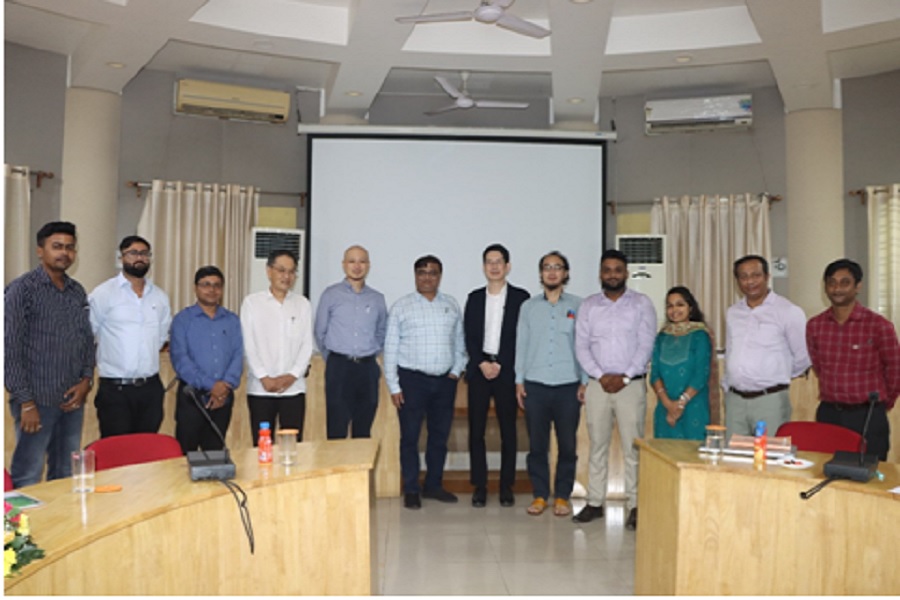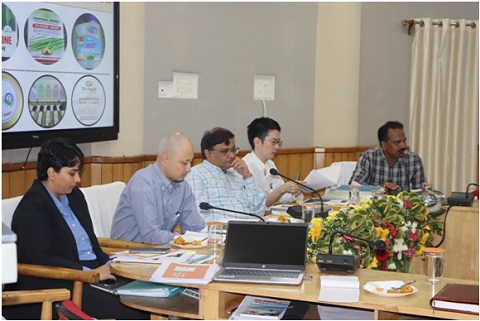
By Firstdespatch Desk Oct 24, 2024
Agartala, Oct 24 (FD) The Japan International Cooperation Agency (JICA) India Mission has successfully completed a mid-term review of the Tripura JICA Project for Sustainable Catchment Forest Management (SCATFORM), reinforcing its commitment to supporting Tripura’s environmental and community development efforts. This review, conducted from October 21st to 24th, 2024, highlighted JICA’s continued focus on sustainable forestry, ecological restoration, and enhancing rural livelihoods in the state.
The delegation that undertook the review comprised several key officials, including Mr. Kei Otsuki, Second Secretary, Economic Wing, Embassy of Japan in India; Mr. Fujiwara Hidenobu, Japanese Representative from JICA India; and Ms. Nishtha Vengurlekar, Development Specialist at JICA India. Their visit aimed at assessing SCATFORM’s progress and exploring areas for future collaboration, particularly focusing on sectors that can sustainably benefit the environment and local communities.
During their stay, the JICA delegation visited several key project sites. One of the highlights was a tour of the “One Stall One Product” Agar Stall at Dharmanagar Railway Station, an initiative to promote agarwood-based products, a crucial non-timber forest product (NTFP) for the state’s economy. Local communities, with support from the project, have been producing innovative products that were showcased during the visit. Another significant stop was the Agar Plantation and Processing Centre in Kadamtala, North Tripura, where sustainable cultivation and processing of agarwood have become vital income-generating activities for local residents. This initiative has provided alternative livelihoods, reducing the community's dependency on traditional forest resources.
Following their engagements in North Tripura, the JICA Mission visited Unakoti District to review AR (Artificial Regeneration) Plantation and TPM (Teak Plantation Management) under the Joyamanipara Joint Forest Management Committee (JFMC). The project has actively engaged local communities in forest regeneration and management, ensuring sustainable management of forest resources. The delegation praised the high level of local participation and the positive impact on the restoration of degraded forest areas.
A notable moment during the review was the inauguration of the Bagaicherra Beat Office, constructed under the Tripura JICA Project. This new office will oversee and coordinate forest management activities, strengthening the project’s operational effectiveness. Additionally, the delegation visited the Sitacherra Eco-Tourism site, being developed as a tourist destination under the JICA Project. This initiative supports the broader SCATFORM objective of promoting eco-tourism as a sustainable livelihood option while conserving Tripura’s natural beauty and biodiversity.
Reflecting on the review, Mr. Kei Otsuki expressed his satisfaction with the project’s achievements, remarking, “This visit to Tripura has been highly insightful. I am deeply impressed with the SCATFORM project’s ability to address both environmental restoration and the economic empowerment of local communities. It is encouraging to see sustainable practices like agarwood cultivation benefiting the people. I hope to return in the future to see further progress.”
The delegation commended the significant progress achieved since SCATFORM’s inception during the 2017-18 fiscal year. The project has successfully promoted the restoration of degraded forest areas, enhanced the water retention capacity of catchment areas, and fostered biodiversity conservation. Furthermore, SCATFORM has taken an inclusive approach, actively involving women and tribal communities in forest management and livelihood activities, establishing a foundation for long-term sustainability.
A key focus of the review was the potential of the non-timber forest products (NTFP) sector, particularly agarwood. Mr. Fujiwara Hidenobu emphasized the economic potential of agarwood and other NTFPs, noting, “The growth potential of the agarwood sector is immense. By further developing this sector and establishing market linkages, we believe it can significantly boost the rural economy while promoting sustainable forest management practices.”
The delegation's visit culminated with a high-level meeting with the Principal Chief Conservator of Forests (PCCF) and the Head of Forest Force (HoFF). The delegates shared their insights and feedback from the mid-term review and discussed strategies for the future. They emphasized the importance of maintaining the project’s momentum and reaffirmed JICA’s long-term commitment to supporting Tripura’s sustainable development initiatives.
Shri Pravin Agrawal, IFS, CEO & Project Director of SCATFORM, expressed his gratitude for JICA’s ongoing support, stating, “The successful mid-term review is a milestone that highlights the significant work being done on the ground. We are deeply encouraged by JICA’s positive feedback, which strengthens our resolve to achieve the project’s long-term goals.”
Notably, the project has achieved financial progress of 43%, showcasing its efficiency in execution. The JICA India team expressed satisfaction with the project’s progress and reiterated their commitment to supporting Tripura’s sustainable development initiatives. The SCATFORM project continues to emerge as a cornerstone of sustainable development in Tripura, focusing on restoring forest ecosystems while empowering local communities through income-generating activities. Its impact is already visible in the regeneration of degraded forests, enhancement of livelihoods, and promotion of sustainable forestry practices, ensuring a brighter future for both the environment and the people of Tripura.
In the coming years, with JICA’s sustained support, the SCATFORM project aims to further expand its efforts in sustainable forestry, rural development, and ecological conservation, positioning Tripura as a leader in community-driven environmental restoration.